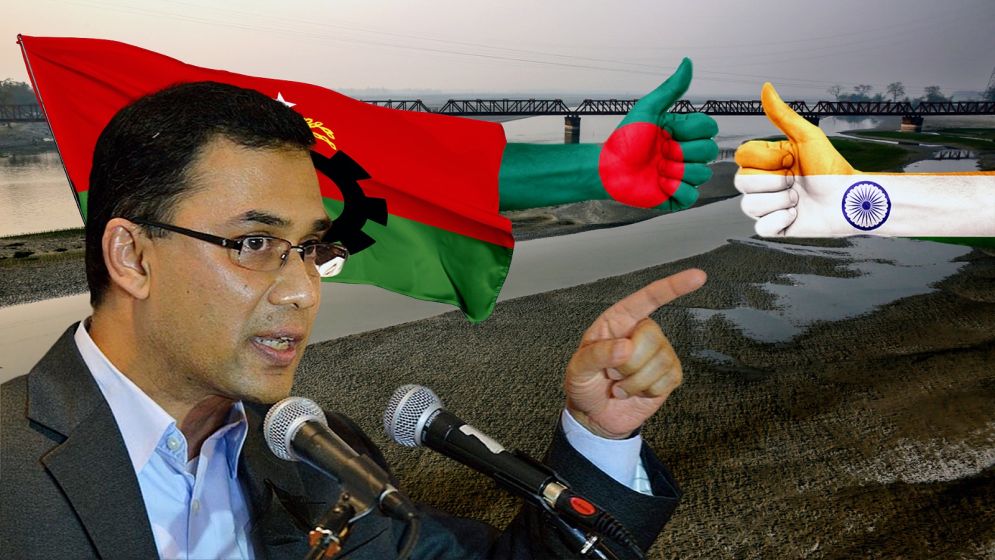Water, politics, and justice: Why BNP’s Teesta fight is a matter of national survival

In an era when political rhetoric often
dominates, overshadowing meaningful action, the Bangladesh Nationalist Party
(BNP) has emerged with a powerful and decisive stance on one of the country's
most pressing issues: the sharing of Teesta River waters.
The party's recent two-day sit-in along eleven
points of the riverbanks in five northern districts is not simply a political
protest—it is a carefully calculated maneuver to bring attention to a
longstanding issue that has long been overlooked.
The Teesta water crisis is far more than a
matter of partisan politics; it touches on Bangladesh’s sovereignty, regional
justice, and environmental sustainability.
This River holds immense significance for
Bangladesh. Flowing from the Himalayas through the Indian states of Sikkim and
West Bengal before entering Bangladesh, it is a lifeline for millions of
people.
The northern regions of Bangladesh rely heavily
on the river for agriculture, fishing, and domestic water needs. Yet, for over
a decade, the country has been denied its rightful share of water, as India
exerts unilateral control over the river upstream.
This has led to devastating droughts, disrupted
agricultural cycles, and left thousands of Bangladeshi families in economic
turmoil.
Despite promises of a water-sharing agreement
between India and Bangladesh, the issue remains unresolved, with India’s
domestic political dynamics—especially the opposition from West Bengal’s state
government—standing in the way.
The BNP’s decision to frame this issue as a
movement, and to mobilize the public with its sit-in, has brought to light an
issue that should have been a national priority for years.
By focusing on the Teesta, the party has
reignited a crucial discussion that speaks to the very heart of the nation’s
welfare.
In taking this bold step, BNP has not only
shown its commitment to the people of Bangladesh, but has also positioned
itself as a political force prioritizing national interest over fleeting
political gain.
The Teesta River Protection Movement Committee,
spearheaded by BNP leaders and activists, sends a powerful message: Bangladesh
will not passively stand by as its vital resources are drained.
By physically aligning themselves with the people suffering the consequences, BNP’s leadership has reinforced the narrative that political opposition is not just about critiquing the government—it is about standing up for the rights and dignity of the people.
-67b5d74d28d59.png)
Advocating for
Bangladesh's water sovereignty
The issue of water sharing has long been at the
heart of Bangladesh-India relations. India, with its dominant position in
bilateral negotiations, has often wielded its influence in ways that fail to
prioritize Bangladesh’s concerns.
The withholding of Teesta River water has
become a symbol of broader frustrations with India’s approach to its neighbor.
Through its recent demonstrations, the BNP has
brought these issues to the forefront, questioning the status quo and calling
for a more equitable, respectful partnership between the two nations.
The party has correctly pointed out that a true
friendship between neighbors should be rooted in fairness, mutual benefit, and
justice, not dominance and unilateral decision-making.
The timing of BNP's Teesta campaign is also
significant. As Bangladesh approaches a critical political juncture with
upcoming elections, raising an issue that directly impacts millions of citizens
is both a moral and strategic move.
By advocating for the fair management of Teesta
waters and the implementation of the Teesta Master Plan, BNP reinforces its
image as a party that listens to the people and fights for their rights.
This campaign not only strengthens BNP’s
political position but also forces the ruling government to confront an issue
they have largely neglected or mishandled.
However, BNP’s activism is not solely focused
on criticizing India. The party has emphasized the need for a comprehensive
river management plan that aligns with Bangladesh's national interests.
The proposed Teesta Master Plan includes
dredging the river, reclaiming land for irrigation, and promoting economic
activities like navigation and tourism.
BNP's push for the implementation of this plan,
especially with the involvement of Chinese collaboration, challenges the
government’s hesitant stance on the matter. Instead of waiting indefinitely for
India’s cooperation, BNP advocates for a proactive alternative that ensures
sustainable water management within Bangladesh's jurisdiction.
At the helm of this strategic approach is
Tarique Rahman, the acting chairman of BNP. Under his leadership, BNP has
sharpened its focus on critical issues such as economic justice and resource
sovereignty.
Tarique has consistently emphasized the
importance of assertive diplomacy and self-reliance in managing Bangladesh’s
resources.
His influence is evident in the party’s
grassroots mobilization and policy-driven approach to the Teesta issue.
Through strategic mass mobilization and international advocacy, Tarique Rahman has ensured that the Teesta movement is not just a political gesture but a genuine fight for Bangladesh's rights.
-67b5d773b4aac.png)
A fight for
equal rights
Tarique Rahman’s leadership has infused the BNP
with a renewed sense of urgency and strategic direction.
Under his guidance, BNP has taken a bold
stance, asserting that Bangladesh must actively pursue its water rights instead
of passively waiting for India's goodwill.
Tarique’s emphasis on engaging with
international stakeholders, particularly China, as an alternative solution to
the Teesta dispute, reflects a pragmatic approach to resolving long-standing
challenges in Bangladesh-India relations.
The movement has also served as a wake-up call
for other political actors. By championing the cause of the marginalized
northern districts—an area often neglected in national development
discourse—BNP has positioned itself as a voice for the voiceless.
Through mobilizing grassroots support and
directly engaging with affected communities, BNP has transformed local
grievances into a national issue.
This strategic move not only consolidates the party’s base but also broadens its appeal across a diverse electorate.
BNP’s Teesta campaign projects an image of
assertiveness and proactive leadership. The party’s demand for fair water
distribution is not merely an electoral tactic; it is a legitimate call for
justice with profound economic, environmental, and humanitarian implications.
Failure to secure Bangladesh’s share of the
Teesta River would lead to dire long-term consequences, including reduced
agricultural productivity, water scarcity, loss of livelihoods, and increased
vulnerability to climate change.
Beyond political calculations, BNP’s movement
is a statement of national pride. Bangladesh, as a sovereign nation, must
assert its rights over shared natural resources, and water security is a
fundamental right.
By rallying around this cause, BNP is
advocating for Bangladesh’s self-respect and dignity on the global stage.
The notion that Bangladesh should remain a
passive recipient of India’s decisions is outdated and harmful to national
interests. BNP’s call for equitable water-sharing reaffirms the country’s
agency in international relations.
This movement also has the potential to
redefine political activism in Bangladesh. Effective opposition politics should
not be solely about resisting the ruling party; it must also champion people’s
causes.
Issues such as water security, environmental
sustainability, and rural livelihoods should be central to political discourse,
and BNP’s initiative has set a commendable example for others to follow.
It provides a model for opposition parties,
encouraging them to engage with the public on substantive issues rather than
merely focusing on electoral contests.
BNP’s Teesta initiative is, therefore, a
pivotal moment in Bangladesh’s political and environmental history. It
transcends political affiliations and speaks to broader questions of resource
equity and national sovereignty.
The success of this movement will depend on
sustained pressure, strategic diplomacy, and ongoing engagement with grassroots
demands.
If BNP can maintain its momentum and push for
tangible outcomes, this could mark a turning point in both the party’s
political trajectory and Bangladesh’s water diplomacy.
Under Tarique’s leadership, BNP has
demonstrated that it does not merely react to circumstances but leads with
purpose. The fight for Teesta is, ultimately, a fight for justice, sovereignty,
and survival—a fight BNP is now leading with renewed vigor and determination.
—
Writer- H. M. Nazmul Alam is an Academic, Journalist, and Political
Analyst. He can be reached at [email protected]

